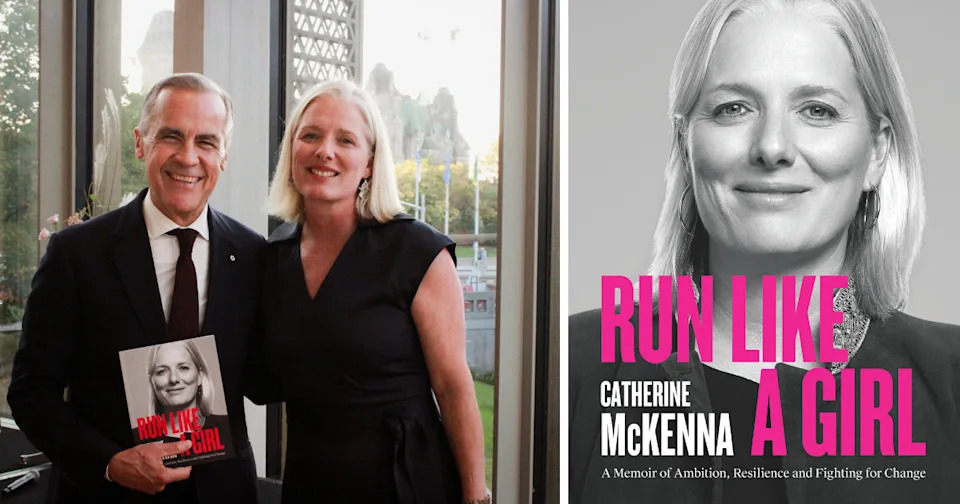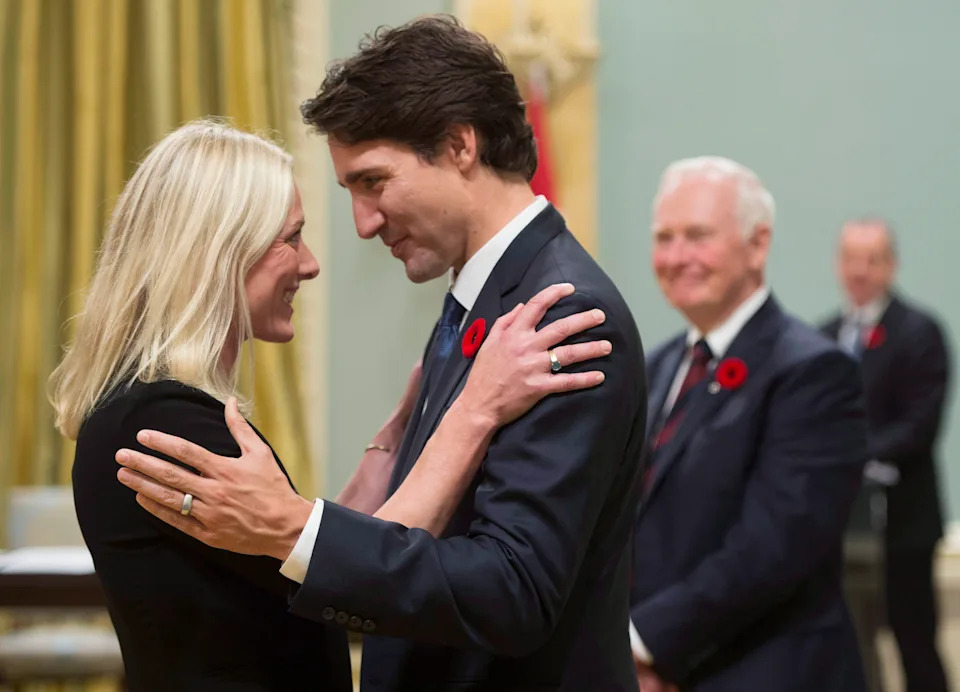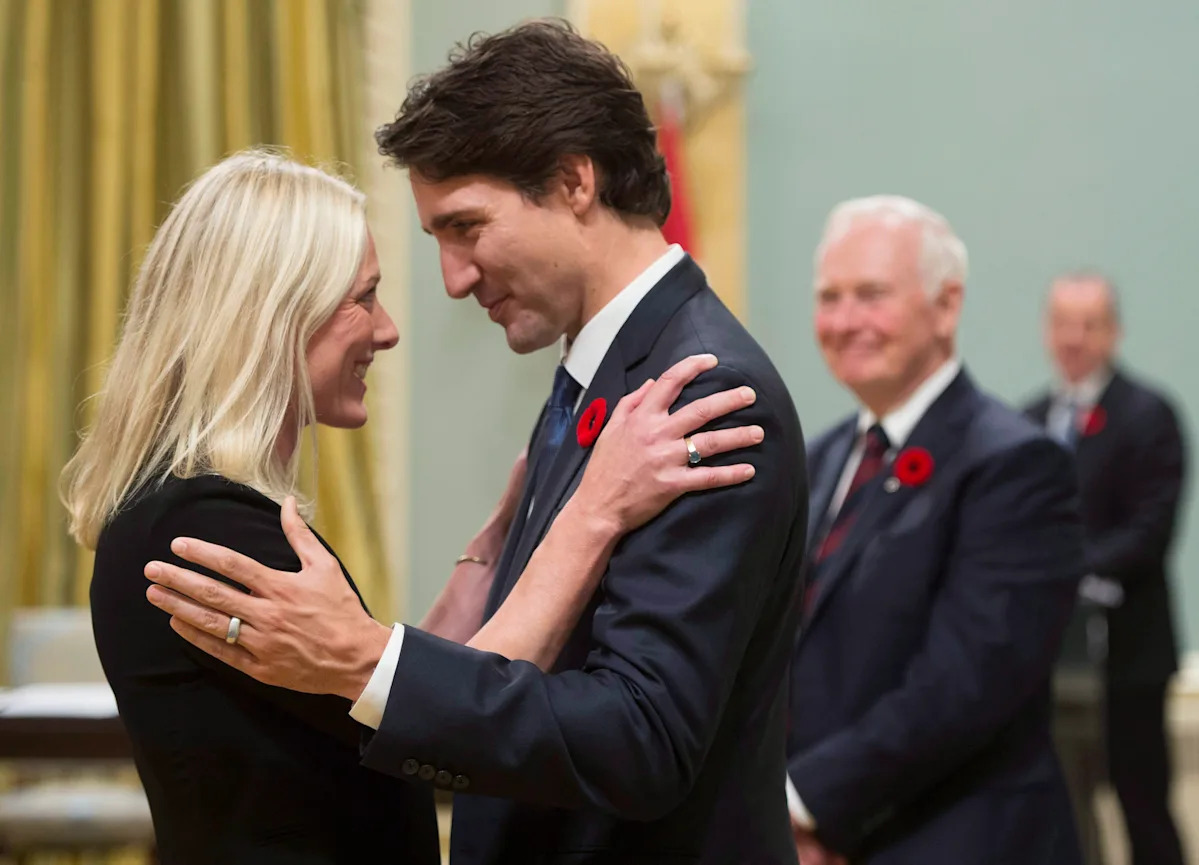Catherine McKenna was at the United Nations when former Conservative member of parliament Gerry Ritz called her “climate Barbie” in an online exchange about a report that found industrialized nations weren’t meeting their Paris climate-change accord targets.
It was 2017. She was Canada’s environment minister, attending a climate action summit at the world body’s headquarters in New York. She thought she wouldn’t give this latest misogynistic attack, a since-deleted Tweet, the time of day.
“I was often advised not to take the bait,” she tells Yahoo Canada via Zoom from her home in Toronto. “But I knew it would impact my ability to do my job if people thought I was an idiot.”
She also knew Ritz’s provocation was a political strategy, because it had the power to hit two liberal birds with one stone.
“There was misogyny against women in politics and there was also climate denial. So it was wrapped up with a little bow. The idea was to diminish me as a woman, call me a bimbo and call out climate change as a joke.”
She decided to respond with a measured tweet that would not only hit its mark, but also point to people like Ritz who were perpetuating the same kind of dirty politics. “Do you use that sexist language about your daughter, mother, sister,” she challenged the former cabinet minister under Stephen Harper. “We need more women in politics. Your sexist comments won’t stop us.”
The tweet went viral, with many in support of McKenna. Ritz later apologized, but the label stuck.
Catherine McKenna on ‘climate Barbie’ dig: ‘It was a nickname I really hated’
“It was a nickname I really hated,” she writes in her book, Run Like A Girl: A Memoir of Ambition, Resilience, and Fighting For Change. The book is full of politics, but she doesn’t see it as a political memoir, per se.
“It’s my experience of how to make change, and sometimes, how to stand up to bullies and get through the day. Hard things are hard.”
Part of the reason McKenna wanted to write the memoir was because she feels she owes it to women and girls, especially, to be frank about the more covert sexism within the ranks of her own party—particularly from the top man himself. She thought it was amazing when her boss, former Prime Minister Justin Trudeau made half his cabinet women when he first took office a decade ago.
“I’m 100 per cent a feminist and I thought his response to a media question about why he did that was amazing. He said, ‘Because it’s 2015!’ But then he kept on saying he was a feminist and that he made his cabinet 50 per cent women. I felt like, ‘Yeah well, I earned this — I wasn’t fulfilling a quota of some sort. To be honest, sometimes the whole Trudeau feminist thing was a bit too heavy, even for me.”
“He and I just have very different styles,” she says. “He would be like ‘I’m a feminist; look at all the women I put in Cabinet. I did this,’ But I would be like, ‘You made me Minister because I’m competent so can we just move on?’ I don’t wake up every day and say: ‘I am a woman; I am a feminist.’ I have a job to do. Maybe he was trying to be helpful, but it didn’t always come off that way to us.”
To be honest, sometimes the whole Trudeau feminist thing was a bit too heavy, even for me.

Canadian Prime Minster Mark Carney poses with Catherine McKenna at an event for her new book, Run Like a Girl.
Catherine McKenna looked up to hometown hero Sheila Copps: ‘Whoa! This woman!’
The Hamilton-born McKenna was scrappy and gritty, an identity that would serve her later as a lawyer and politician.
“It totally helped me. When I grew up, Hamilton was the butt of all jokes,” she says of the city known as a working class and steel town. “I was a middle-class kid and you couldn’t be fancy in Hamilton, you just couldn’t. People would not have it.”
As MP for Ottawa-Centre, she found it to be a huge contrast. “I love Ottawa-Centre but it’s a very particular place,” she says.
“People are very into politics, but in Hamilton no one has any idea what you’re talking about and they probably don’t care.”
Behind the scenes, McKenna says she would often pull out the “Hamilton card” just to make the point for colleagues not to get “too fancy” and talk about things like a regular person.
You couldn’t be fancy in Hamilton, you just couldn’t. People would not have it.
When Sheila Copps, whose father was mayor of Hamilton, came on the political scene, McKenna was taken aback. Copps was deputy prime minister under Jean Chrétien from 1993 to 1997 and became a model for McKenna and other women in politics.
“I was like, ‘Whoa! This woman!’ She was so scrappy and just fighting her way.”
Copps was the first sitting MP to give birth while in office, and she called out the sexist treatment of women at the time.
“John Crosbie liked to taunt her when he was minister of justice,” McKenna writes in her book. “He thought it was hilarious when he told her in a debate in Parliament in 1985, ‘Just quiet down, baby.’ But she wasn’t having it. She stood up and famously retorted: ‘I am a member of Parliament, thirty-two years old, elected to represent the people of my area, and I resent the comments of the minister who is responsible for equality of women in this country … I’m not his baby, and I’m nobody’s baby.”
Copps’ memoir, aptly titled Nobody’s Baby, also made a lasting impression on McKenna. “The misogyny and sexism she faced was insane. She was sexually harassed and even raped by a colleague. She put up with so much garbage. I admired her. And then she was also environment minister, and an amazing one at that.”
She put up with so much garbage. I admired her.
Catherine McKenna: ‘What on earth are we doing to the planet?’
It was in Indonesia, where she once made a documentary, that McKenna had her epiphany about the environment.
An avid swimmer (McKenna’s initial dream was to become an Olympic swimmer and she even made it as far as the trials), she would often go snorkeling and learned to scuba dive. “I loved diving and swimming in the ocean and discovered so much beauty in the underwater world.” She also discovered the alarming human impact on the ocean: “There was all this plastic. So many plastic bags especially. I think a lot of it was coming from China. I thought to myself: ‘What on earth are we doing to the planet?’”
McKenna didn’t know what she could do but felt something had to be done. “It wasn’t just about having clear waters for swimming,” she says. “People in Indonesia rely on the ocean for so many things: water, fishing, tourism; it was pretty clear to me that this was a bad situation.”
Why Catherine McKenna got into politics: Motherhood and a debate around gun laws in Canada
The first time McKenna thought about running in politics was in September 2010 when she took her two young children to Question Period. “I wanted to hear the debate about the long-gun registry, which the Conservatives, under Prime Minister Stephen Harper, wanted to abolish,” she writes.
This was a personal issue for McKenna: she was 18 when the Montreal massacre took place in 1989. “Like most Canadians, especially women of my generation, I was horrified by it.” Women in an engineering class at École Polytechnique were gunned down by a mentally-disturbed male who had shouted: “You’re all a bunch of feminists, and I hate feminists.”
Earlier, when McKenna first became a mother in 2004, she told herself she only wanted to do work meaningful to her that would “make the world better.”
“I wanted more out of life than becoming a partner at a law firm.”

Prime Minister Justin Trudeau hugs Environment and Climate Change Minister Catherine McKenna at Rideau Hall in Ottawa on Wednesday, November 4, 2015. THE CANADIAN PRESS/Sean Kilpatrick
Justin Trudeau’s ‘feminism’: ‘He did say it a lot’
When Trudeau won the Liberal leadership in 2013, McKenna was enthusiastic but admits she had some reservations at first.
“I guess I’m very Irish,” she says, laughing.
“I really admired his dad. We were pure Elliot Trudeau Liberals in my house. My dad was an immigrant from Ireland and he bought into multiculturalism and bilingualism. We went to a French school on the other side of the city.”
But she liked the younger Trudeau’s platform. She thought it was amazing when he made half his cabinet women, but there was a lot of lingo around the word feminist.
“He did say it a lot: It was feminist foreign policy, the feminist budget, etc. What does a feminist foreign policy even mean?” she questions. “We said we would have more women peacekeepers, but we didn’t. In the end only outcomes matter.”
McKenna says that feminist narrative fell apart when it came to Chrystia Freeland. “It became a problem for him; if you keep saying you’re a feminist and then you have a conflict with a woman — whether it’s a legitimate conflict or not — then everyone is like, no, not really a feminist when a woman is kicked out of Cabinet,” she says, referring to Freeland’s resignation last year (McKenna had quit politics long before this, in 2021).
Catherine McKenna on leaving politics: ‘Sometimes you need to be on the outside’
McKenna says she was the first prominent former cabinet minister to call for Trudeau’s resignation. “It’s just unfortunate the way he left,” she says.
“He was forced out because of a decision he made with a woman who had been in his cabinet as a loyal soldier for a long time. She threw the grenade back at him. Some people [in government] were mad that I spoke out.”
McKenna has been out of politics for four years. “We did great things,” she says. “Trudeau supported me and he gave me a fair bit of leeway.”
She says it was “very, very” difficult to get access to him at times.
“I didn’t even want it most of the time,” she adds. “I just wanted it on carbon pricing. I needed to look him in the eye and be like, ‘Are you going to support us on this?’ because some people in the PM’s office didn’t want to do that.”
She’s proud that her team got the first credible climate plan and that they landed carbon pricing. “I am sad that we lost it, yes, but hard things are hard, and we did it.”
I am sad that we lost it, yes, but hard things are hard, and we did it.
McKenna does wish she had fought more against the oil and gas industry and the Conservative politicians they sponsored, but all in all, she feels like she had done what she had come to do.
“I just felt like I was done,” she says. “I was staying on largely at that point because I felt that people would think I left because I got all this hate, but that’s a terrible message. And then I thought: ‘This is really dumb. This is your life. You gotta do what you want.’ I had promised myself that I had done what I came to do, I would leave — and I left on my own terms.”
She knew people would wonder: “If you really cared about climate, how can you leave?”
Since leaving politics, McKenna has founded Climate and Nature Solutions, an environmental advisory firm and has served as the Chair of the United Nations High-Level Expert Group on Net-Zero Emissions Commitments of Non-State Entities. “It’s in my DNA to do my own thing.”
“You can work on climate outside of politics,” she asserts. “In fact, sometimes you need to be on the outside so you can push the inside to do more.”

